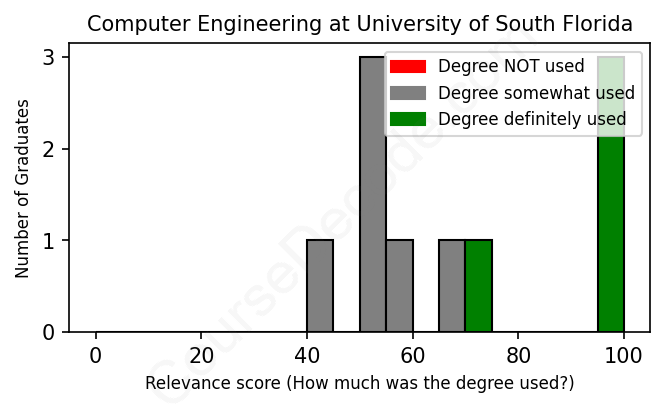
First, some facts. Of the Computer Engineering graduates from University of South Florida we've analyzed , here's how many have used (or NOT used) their degree in their career:

These are estimates based on AI analysis of 10 LinkedIn profiles (see below).
The verdict? Slightly above average. Overall, with an average relevance score of 69%, Computer Engineering graduates from University of South Florida have a slightly higher likelihood (+2%) of finding work in this field compared to the average graduate across all fields:
And for comparison, here's the chart for all profiles we've looked at across all degrees.
Also, after graduating, only 20% of these graduates have pursued further education other than another Bachelor's degree (such as a Masters degree or other), compared to the average across all profiles of 35%. This suggests a Bachelors degree is enough for most Computer Engineering graduates, and it's normal to look for work straight after graduation.
See the details:
|
Relevance score: 67% We think this person has gone into a career only somewhat relevant to their degree. We think this person has gone into a career only somewhat relevant to their degree.
DEGREE INFOGraduated in 2012 from University of South Florida with a Bachelor of Science (B.S.) in Computer Engineering. No other secondary education since. JOB HISTORY SINCE GRADUATIONSoftware Engineer II, Avionics/Navigation Group CAE USA May 2012 - Aug 2016 Project Engineer  CAE USA INC Aug 2016 - Present ABOUTNo information provided. |
The top 10 most common jobs done by the graduates we've analyzed (ranked most common to least) are:
Based on the profiles of individuals who graduated with a Computer Engineering degree from the University of South Florida, the most common jobs fall into categories like software engineering, project coordination, and roles in engineering assistance. Many of these positions, such as Software Engineer II and DevOps Engineer, leverage the skills and knowledge gained during their studies, making them highly relevant to Computer Engineering. These roles involve practical applications of programming, system integration, and development processes, which are core components of computer engineering education.
On the flip side, there are also numerous positions that, while they might use some transferable skills, don't directly rely on a computer engineering background. Jobs like Project Engineer or various roles in finance and customer service show that not everyone stays strictly within the engineering domain after graduation. Although these positions can incorporate analytical thinking or data interpretation, they generally don't tap into the deeper technical competencies that a Computer Engineering degree offers. So, while a lot of graduates do find roles that fit well with their technical expertise, some end up in more varied fields that don't utilize their engineering background as directly.
Here is a visual representation of the most common words in job titles for Computer Engineering graduates (this is across all Computer Engineering graduates we've analyzed, not just those who went to University of South Florida):

So, if you check out the career paths of folks who graduated with a Computer Engineering degree from the University of South Florida, you'll see some interesting trends. A lot of them seem to land solid tech jobs right after graduation. For instance, graduates from 2012 and onwards started off in roles like Software Engineers or Project Engineers, which is pretty on point for their degree. Even those who had internships or assistant roles tended to pivot back to tech-heavy positions shortly after. However, some students did take detours, getting involved in roles like Customer Invoice Coordinators or Financial Reporting Interns, which aren’t directly related to Computer Engineering.
Fast forward five to ten years, and you can see a mix. The graduates who started in engineering roles generally progressed up the ladder in their respective companies and even shifted to roles with more responsibility, like Senior Engineers or Project Leaders. Others, like some graduates who ended up in business-related positions, might not have stayed in the tech field, which is a bummer considering the degree they earned. Overall, it seems like the more successful career trajectories are in engineering and software development, so for someone considering this major, there's quite a bit of potential for a good career in tech. Just keep in mind that some paths could lead away from engineering, depending on choices and opportunities along the way.
So, getting a Bachelor’s degree in Computer Engineering, like the one at the University of South Florida, can definitely be challenging but not impossible. It covers a lot of tough topics like circuits, programming, and systems design, so expect to do some serious math and get hands-on with projects. If you're someone who enjoys problem-solving and has a knack for tech, you might find it more manageable, but it's definitely not a walk in the park. Overall, I'd say it tends to be on the harder side compared to many other degrees, but with the right mindset and a good study plan, you can totally handle it!
Most commonly, in the LinkedIn profiles we've looked at, it takes people 4 years to finish a Bachelor degree in Computer Engineering.
Alright, so looking at these Computer Engineering grads from USF, it seems like they've generally landed pretty decent jobs, especially if we consider that they’re in a tech field where salaries tend to be on the higher side. The first grad, for instance, has climbed the ladder quite well and is now a project engineer, which usually pays well. The other grads have been involved in various roles, from teaching assistants to software engineers, and even roles at big companies like Northrop Grumman and Apple, which suggests they’re likely making good money too. While there are some entry-level positions mixed in, overall, it looks like most of these folks are on a solid path to making a decent income as they gain experience. It’s pretty encouraging if you’re considering a similar path!
Here is a visual representation of the most common words seen in the "about" section of LinkedIn profiles who have a Bachelor degree in Computer Engineering (this is across all Computer Engineering graduates we've analyzed, not just those who went to University of South Florida). This may or may not be useful:

Here are all colleges offering a Bachelor degree in Computer Engineering (ordered by the average relevance score of their Computer Engineering graduates, best to worst) where we have analyzed at least 10 of their graduates:
| College | Score | Count |
|---|---|---|
 University of Florida University of Florida
|
95 | 18 |
 Michigan State University Michigan State University
|
94 | 10 |
 Brigham Young University Brigham Young University
|
94 | 10 |
 Penn State University Penn State University
|
92 | 14 |
 California Polytechnic State University-San Luis Obispo California Polytechnic State University-San Luis Obispo
|
91 | 14 |
 University of Central Florida University of Central Florida
|
90 | 14 |
 Georgia Institute of Technology Georgia Institute of Technology
|
90 | 14 |
 Purdue University Purdue University
|
86 | 34 |
 University of Illinois at Urbana-Champaign University of Illinois at Urbana-Champaign
|
86 | 30 |
 Iowa State University Iowa State University
|
86 | 25 |
 Texas A&M University Texas A&M University
|
85 | 17 |
 San Jose State University San Jose State University
|
85 | 16 |
 Clemson University Clemson University
|
85 | 14 |
 Dwarkadas J. Sanghvi College of Engineering Dwarkadas J. Sanghvi College of Engineering
|
85 | 10 |
 North Dakota State University North Dakota State University
|
84 | 12 |
 Savitribai Phule Pune University Savitribai Phule Pune University
|
83 | 25 |
 University of Mumbai University of Mumbai
|
82 | 43 |
 New Jersey Institute of Technology New Jersey Institute of Technology
|
81 | 11 |
 University of North Carolina at Charlotte University of North Carolina at Charlotte
|
79 | 11 |
 California State Polytechnic University-Pomona California State Polytechnic University-Pomona
|
76 | 11 |
 The University of Texas at Dallas The University of Texas at Dallas
|
76 | 18 |
 University of South Florida University of South Florida
|
69 | 10 |
 Gujarat Technological University, Ahmedbabd Gujarat Technological University, Ahmedbabd
|
55 | 13 |